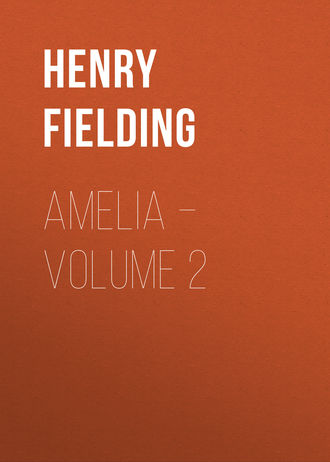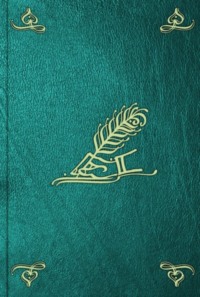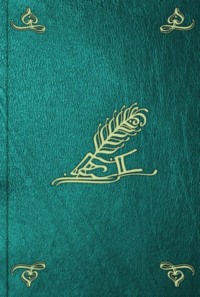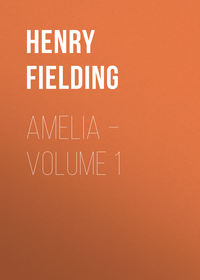 полная версия
полная версияAmelia – Volume 2
Neither Miss Bellamy nor Mrs. Gibber were ever in a greater consternation on the stage than now appeared in the countenance of Mrs. James. "Good Heavens! brother," cries she; "what do you tell me? you have frightened me to death. Let your man get me a glass of water immediately, if you have not a mind to see me die before your face. When, where, how was this quarrel? why did you not prevent it if you knew of it? is it not enough to be every day tormenting me with hazarding your own life, but must you bring the life of one who you know must be, and ought to be, so much the dearest of all to me, into danger? take your sword, brother, take your sword, and plunge it into my bosom; it would be kinder of you than to fill it with such dreads and terrors." Here she swallowed the glass of water, and then threw herself back in her chair, as if she had intended to faint away.
Perhaps, if she had so, the colonel would have lent her no assistance, for she had hurt him more than by ten thousand stabs. He sat erect in his chair, with his eyebrows knit, his forehead wrinkled, his eyes flashing fire, his teeth grating against each other, and breathing horrour all round him. In this posture he sat for some time silent, casting disdainful looks at his sister. At last his voice found its way through a passion which had almost choaked him, and he cried out, "Sister, what have I done to deserve the opinion you express of me? which of my actions hath made you conclude that I am a rascal and a coward? look at that poor sword, which never woman yet saw but in its sheath; what hath that done to merit your desire that it should be contaminated with the blood of a woman?"
"Alas! brother," cried she, "I know not what you say; you are desirous, I believe, to terrify me out of the little senses I have left. What can I have said, in the agonies of grief into which you threw me, to deserve this passion?"
"What have you said?" answered the colonel: "you have said that which, if a man had spoken, nay, d – n me, if he had but hinted that he durst even think, I would have made him eat my sword; by all the dignity of man, I would have crumbled his soul into powder. But I consider that the words were spoken by a woman, and I am calm again. Consider, my dear, that you are my sister, and behave yourself with more spirit. I have only mentioned to you my surmise. It may not have happened as I suspect; but, let what will have happened, you will have the comfort that your husband hath behaved himself with becoming dignity, and lies in the bed of honour."
"Talk not to me of such comfort," replied the lady; "it is a loss I cannot survive. But why do I sit here lamenting myself? I will go this instant and know the worst of my fate, if my trembling limbs will carry me to my coach. Good morrow, dear brother; whatever becomes of me, I am glad to find you out of danger." The colonel paid her his proper compliments, and she then left the room, but returned instantly back, saying, "Brother, I must beg the favour of you to let your footman step to my mantua-maker; I am sure it is a miracle, in my present distracted condition, how it came into my head." The footman was presently summoned, and Mrs. James delivered him his message, which was to countermand the orders which she had given that very morning to make her up a new suit of brocade. "Heaven knows," says she, "now when I can wear brocade, or whether ever I shall wear it." And now, having repeated her message with great exactness, lest there should be any mistake, she again lamented her wretched situation, and then departed, leaving the colonel in full expectation of hearing speedy news of the fatal issue of the battle.
But, though the reader should entertain the same curiosity, we must be excused from satisfying it till we have first accounted for an incident which we have related in this very chapter, and which, we think, deserves some solution. The critic, I am convinced, already is apprized that I mean the friendly behaviour of James to Booth, which, from what we had before recorded, seemed so little to be expected.
It must be remembered that the anger which the former of these gentlemen had conceived against the latter arose entirely from the false account given by Miss Matthews of Booth, whom that lady had accused to Colonel James of having as basely as wickedly traduced his character.
Now, of all the ministers of vengeance, there are none with whom the devil deals so treacherously as with those whom he employs in executing the mischievous purposes of an angry mistress; for no sooner is revenge executed on an offending lover that it is sure to be repented; and all the anger which before raged against the beloved object, returns with double fury on the head of his assassin.
Miss Matthews, therefore, no, sooner heard that Booth was killed (for so was the report at first, and by a colonel of the army) than she immediately concluded it to be James. She was extremely shocked with the news, and her heart instantly began to relent. All the reasons on which she had founded her love recurred, in the strongest and liveliest colours, to her mind, and all the causes of her hatred sunk down and disappeared; or, if the least remembrance of anything which had disobliged her remained, her heart became his zealous advocate, and soon satisfied her that her own fates were more to be blamed than he, and that, without being a villain, he could have acted no otherwise than he had done.
In this temper of mind she looked on herself as the murderer of an innocent man, and, what to her was much worse, of the man she had loved, and still did love, with all the violence imaginable. She looked on James as the tool with which she had done this murder; and, as it is usual for people who have rashly or inadvertently made any animate or inanimate thing the instrument of mischief to hate the innocent means by which the mischief was effected (for this is a subtle method which the mind invents to excuse ourselves, the last objects on whom we would willingly wreak our vengeance), so Miss Matthews now hated and cursed James as the efficient cause of that act which she herself had contrived and laboured to carry into execution.
She sat down therefore in a furious agitation, little short of madness, and wrote the following letter:
"I Hope this will find you in the hands of justice, for the murder of one of the best friends that ever man was blest with. In one sense, indeed, he may seem to have deserved his fate, by chusing a fool for a friend; for who but a fool would have believed what the anger and rage of an injured woman suggested; a story so improbable, that I could scarce be thought in earnest when I mentioned it?
"Know, then, cruel wretch, that poor Booth loved you of all men breathing, and was, I believe, in your commendation guilty of as much falsehood as I was in what I told you concerning him.
"If this knowledge makes you miserable, it is no more than you have made the unhappy
F. MATTHEWS."Chapter ix.
Being the last chapter of the fifth book
We shall now return to Colonel James and Mr. Booth, who walked together from Colonel Bath's lodging with much more peaceable intention than that gentleman had conjectured, who dreamt of nothing but swords and guns and implements of wars.
The Birdcage-walk in the Park was the scene appointed by James for unburthening his mind. – Thither they came, and there James acquainted Booth with all that which the reader knows already, and gave him the letter which we have inserted at the end of the last chapter.
Booth exprest great astonishment at this relation, not without venting some detestation of the wickedness of Miss Matthews; upon which James took him up, saying, he ought not to speak with such abhorrence of faults which love for him had occasioned.
"Can you mention love, my dear colonel," cried Booth, "and such a woman in the same breath?"
"Yes, faith! can I," says James; "for the devil take me if I know a more lovely woman in the world." Here he began to describe her whole person; but, as we cannot insert all the description, so we shall omit it all; and concluded with saying, "Curse me if I don't think her the finest creature in the universe. I would give half my estate, Booth, she loved me as well as she doth you. Though, on second consideration, I believe I should repent that bargain; for then, very possibly, I should not care a farthing for her."
"You will pardon me, dear colonel," answered Booth; "but to me there appears somewhat very singular in your way of thinking. Beauty is indeed the object of liking, great qualities of admiration, good ones of esteem; but the devil take me if I think anything but love to be the object of love."
"Is there not something too selfish," replied James, "in that opinion? but, without considering it in that light, is it not of all things the most insipid? all oil! all sugar! zounds! it is enough to cloy the sharp-set appetite of a parson. Acids surely are the most likely to quicken."
"I do not love reasoning in allegories," cries Booth; "but with regard to love, I declare I never found anything cloying in it. I have lived almost alone with my wife near three years together, was never tired with her company, nor ever wished for any other; and I am sure I never tasted any of the acid you mention to quicken my appetite."
"This is all very extraordinary and romantic to me," answered the colonel. "If I was to be shut up three years with the same woman, which Heaven forbid! nothing, I think, could keep me alive but a temper as violent as that of Miss Matthews. As to love, it would make me sick to death in the twentieth part of that time. If I was so condemned, let me see, what would I wish the woman to be? I think no one virtue would be sufficient. With the spirit of a tigress I would have her be a prude, a scold, a scholar, a critic, a wit, a politician, and a Jacobite; and then, perhaps, eternal opposition would keep up our spirits; and, wishing one another daily at the devil, we should make a shift to drag on a damnable state of life, without much spleen or vapours."
"And so you do not intend," cries Booth, "to break with this woman?"
"Not more than I have already, if I can help it," answered the colonel.
"And you will be reconciled to her?" said Booth.
"Yes, faith! will I, if I can," answered the colonel; "I hope you have no objection."
"None, my dear friend," said Booth, "unless on your account."
"I do believe you," said the colonel: "and yet, let me tell you, you are a very extraordinary man, not to desire me to quit her on your own account. Upon my soul, I begin to pity the woman, who hath placed her affection, perhaps, on the only man in England of your age who would not return it. But for my part, I promise you, I like her beyond all other women; and, whilst that is the case, my boy, if her mind was as full of iniquity as Pandora's box was of diseases, I'd hug her close in my arms, and only take as much care as possible to keep the lid down for fear of mischief. But come, dear Booth," said he, "let us consider your affairs; for I am ashamed of having neglected them so long; and the only anger I have against this wench is, that she was the occasion of it."
Booth then acquainted the colonel with the promises he had received from the noble lord, upon which James shook him by the hand, and heartily wished him joy, crying, "I do assure you, if you have his interest, you will need no other; I did not know you was acquainted with him."
To which Mr. Booth answered, "That he was but a new acquaintance, and that he was recommended to him by a lady."
"A lady!" cries the colonel; "well, I don't ask her name. You are a happy man, Booth, amongst the women; and, I assure you, you could have no stronger recommendation. The peer loves the ladies, I believe, as well as ever Mark Antony did; and it is not his fault if he hath not spent as much upon them. If he once fixes his eye upon a woman, he will stick at nothing to get her."
"Ay, indeed!" cries Booth. "Is that his character?"
"Ay, faith," answered the colonel, "and the character of most men besides him. Few of them, I mean, will stick at anything beside their money. Jusque a la Bourse is sometimes the boundary of love as well as friendship. And, indeed, I never knew any other man part with his money so very freely on these occasions. You see, dear Booth, the confidence I have in your honour."
"I hope, indeed, you have," cries Booth, "but I don't see what instance you now give me of that confidence."
"Have not I shewn you," answered James, "where you may carry your goods to market? I can assure you, my friend, that is a secret I would not impart to every man in your situation, and all circumstances considered."
"I am very sorry, sir," cries Booth very gravely, and turning as pale as death, "you should entertain a thought of this kind; a thought which hath almost frozen up my blood. I am unwilling to believe there are such villains in the world; but there is none of them whom I should detest half so much as myself, if my own mind had ever suggested to me a hint of that kind. I have tasted of some distresses of life, and I know not to what greater I may be driven, but my honour, I thank Heaven, is in my own power, and I can boldly say to Fortune she shall not rob me of it."
"Have I not exprest that confidence, my dear Booth?" answered the colonel. "And what you say now well justifies my opinion; for I do agree with you that, considering all things, it would be the highest instance of dishonour."
"Dishonour, indeed!" returned Booth. "What! to prostitute my wife! Can
I think there is such a wretch breathing?"
"I don't know that," said the colonel, "but I am sure it was very far from my intention to insinuate the least hint of any such matter to you. Nor can I imagine how you yourself could conceive such a thought. The goods I meant were no other than the charming person of Miss Matthews, for whom I am convinced my lord would bid a swinging price against me."
Booth's countenance greatly cleared up at this declaration, and he answered with a smile, that he hoped he need not give the colonel any assurances on that head. However, though he was satisfied with regard to the colonel's suspicions, yet some chimeras now arose in his brain which gave him no very agreeable sensations. What these were, the sagacious reader may probably suspect; but, if he should not, we may perhaps have occasion to open them in the sequel. Here we will put an end to this dialogue, and to the fifth book of this history.
BOOK VI
Chapter i.
Panegyrics on beauty, with other grave matters
The colonel and Booth walked together to the latter's lodging, for as it was not that day in the week in which all parts of the town are indifferent, Booth could not wait on the colonel.
When they arrived in Spring-garden, Booth, to his great surprize, found no one at home but the maid. In truth, Amelia had accompanied Mrs. Ellison and her children to his lordship's; for, as her little girl showed a great unwillingness to go without her, the fond mother was easily persuaded to make one of the company.
Booth had scarce ushered the colonel up to his apartment when a servant from Mrs. James knocked hastily at the door. The lady, not meeting with her husband at her return home, began to despair of him, and performed everything which was decent on the occasion. An apothecary was presently called with hartshorn and sal volatile, a doctor was sent for, and messengers were despatched every way; amongst the rest, one was sent to enquire at the lodgings of his supposed antagonist.
The servant hearing that his master was alive and well above-stairs, ran up eagerly to acquaint him with the dreadful situation in which he left his miserable lady at home, and likewise with the occasion of all her distress, saying, that his lady had been at her brother's, and had there heard that his honour was killed in a duel by Captain Booth.
The colonel smiled at this account, and bid the servant make haste back to contradict it. And then turning to Booth, he said, "Was there ever such another fellow as this brother of mine? I thought indeed, his behaviour was somewhat odd at the time. I suppose he overheard me whisper that I would give you satisfaction, and thence concluded we went together with a design of tilting. D – n the fellow, I begin to grow heartily sick of him, and wish I could get well rid of him without cutting his throat, which I sometimes apprehend he will insist on my doing, as a return for my getting him made a lieutenant- colonel."
Whilst these two gentlemen were commenting on the character of the third, Amelia and her company returned, and all presently came up- stairs, not only the children, but the two ladies, laden with trinkets as if they had been come from a fair. Amelia, who had been highly delighted all the morning with the excessive pleasure which her children enjoyed, when she saw Colonel James with her husband, and perceived the most manifest marks of that reconciliation which she knew had been so long and so earnestly wished by Booth, became so transported with joy, that her happiness was scarce capable of addition. Exercise had painted her face with vermilion; and the highest good-humour had so sweetened every feature, and a vast flow of spirits had so lightened up her bright eyes, that she was all a blaze of beauty. She seemed, indeed, as Milton sublimely describes Eve,
– Adorn'dWith what all Earth or Heaven could bestowTo make her amiable.Again: —
Grace was in all her steps, Heaven in her eye,In every gesture, dignity and love.Or, as Waller sweetly, though less sublimely sings: —
Sweetness, truth, and every graceWhich time and use are wont to teach,The eye may in a moment reach,And read distinctly in her face.Or, to mention one poet more, and him of all the sweetest, she seemed to be the very person of whom Suckling wrote the following lines, where, speaking of Cupid, he says,
All his lovely looks, his pleasing fires,All his sweet motions, all his taking smiles;All that awakes, all that inflames desires,All that sweetly commands, all that beguiles,He does into one pair of eyes convey,And there begs leave that he himself may stay.Such was Amelia at this time when she entered the room; and, having paid her respects to the colonel, she went up to her husband, and cried, "O, my dear! never were any creatures so happy as your little things have been this whole morning; and all owing to my lord's goodness; sure never was anything so good-natured and so generous!" She then made the children produce their presents, the value of which amounted to a pretty large sum; for there was a gold watch, amongst the trinkets, that cost above twenty guineas.
Instead of discovering so much satisfaction on this occasion as Amelia expected, Booth very gravely answered, "And pray, my dear, how are we to repay all these obligations to his lordship?" "How can you ask so strange a question?" cries Mrs. Ellison: "how little do you know of the soul of generosity (for sure my cousin deserves that name) when you call a few little trinkets given to children an obligation!" "Indeed, my dear," cries Amelia, "I would have stopped his hand if it had been possible; nay, I was forced at last absolutely to refuse, or I believe he would have laid a hundred pound out on the children; for I never saw any one so fond of children, which convinces me he is one of the best of men; but I ask your pardon, colonel, "said she, turning to him; "I should not entertain you with these subjects; yet I know you have goodness enough to excuse the folly of a mother."
The colonel made a very low assenting bow, and soon after they all sat down to a small repast; for the colonel had promised Booth to dine with him when they first came home together, and what he had since heard from his own house gave him still less inclination than ever to repair thither.
But, besides both these, there was a third and stronger inducement to him to pass the day with his friend, and this was the desire of passing it with his friend's wife. When the colonel had first seen Amelia in France, she was but just recovered from a consumptive habit, and looked pale and thin; besides, his engagements with Miss Bath at that time took total possession of him, and guarded his heart from the impressions of another woman; and, when he had dined with her in town, the vexations through which she had lately passed had somewhat deadened her beauty; besides, he was then engaged, as we have seen, in a very warm pursuit of a new mistress, but now he had no such impediment; for, though the reader hath just before seen his warm declarations of a passion for Miss Matthews, yet it may be remembered that he had been in possession of her for above a fortnight; and one of the happy properties of this kind of passion is, that it can with equal violence love half a dozen or half a score different objects at one and the same time.
But indeed such were the charms now displayed by Amelia, of which we endeavoured above to draw some faint resemblance, that perhaps no other beauty could have secured him from their influence; and here, to confess a truth in his favour, however the grave or rather the hypocritical part of mankind may censure it, I am firmly persuaded that to withdraw admiration from exquisite beauty, or to feel no delight in gazing at it, is as impossible as to feel no warmth from the most scorching rays of the sun. To run away is all that is in our power; and in the former case, if it must be allowed we have the power of running away, it must be allowed also that it requires the strongest resolution to execute it; for when, as Dryden says,
All paradise is open'd in a face, how natural is the desire of going thither! and how difficult to quit the lovely prospect!
And yet, however difficult this may be, my young readers, it is absolutely necessary, and that immediately too: flatter not yourselves that fire will not scorch as well as warm, and the longer we stay within its reach the more we shall burn. The admiration of a beautiful woman, though the wife of our dearest friend, may at first perhaps be innocent, but let us not flatter ourselves it will always remain so; desire is sure to succeed; and wishes, hopes, designs, with a long train of mischiefs, tread close at our heels. In affairs of this kind we may most properly apply the well-known remark of nemo repente fuit turpissimus. It fares, indeed, with us on this occasion as with the unwary traveller in some parts of Arabia the desert, whom the treacherous sands imperceptibly betray till he is overwhelmed and lost. In both cases the only safety is by withdrawing our feet the very first moment we perceive them sliding.
This digression may appear impertinent to some readers; we could not, however, avoid the opportunity of offering the above hints; since of all passions there is none against which we should so strongly fortify ourselves as this, which is generally called love; for no other lays before us, especially in the tumultuous days of youth, such sweet, such strong and almost irresistible temptations; none hath produced in private life such fatal and lamentable tragedies; and what is worst of all, there is none to whose poison and infatuation the best of minds are so liable. Ambition scarce ever produces any evil but when it reigns in cruel and savage bosoms; and avarice seldom flourishes at all but in the basest and poorest soil. Love, on the contrary, sprouts usually up in the richest and noblest minds; but there, unless nicely watched, pruned, and cultivated, and carefully kept clear of those vicious weeds which are too apt to surround it, it branches forth into wildness and disorder, produces nothing desirable, but choaks up and kills whatever is good and noble in the mind where it so abounds. In short, to drop the allegory, not only tenderness and good nature, but bravery, generosity, and every virtue are often made the instruments of effecting the most atrocious purposes of this all-subduing tyrant.
Chapter ii.
Which will not appear, we presume, unnatural to all married readers
If the table of poor Booth afforded but an indifferent repast to the colonel's hunger, here was most excellent entertainment of a much higher kind. The colonel began now to wonder within himself at his not having before discovered such incomparable beauty and excellence. This wonder was indeed so natural that, lest it should arise likewise in the reader, we thought proper to give the solution of it in the preceding chapter.









